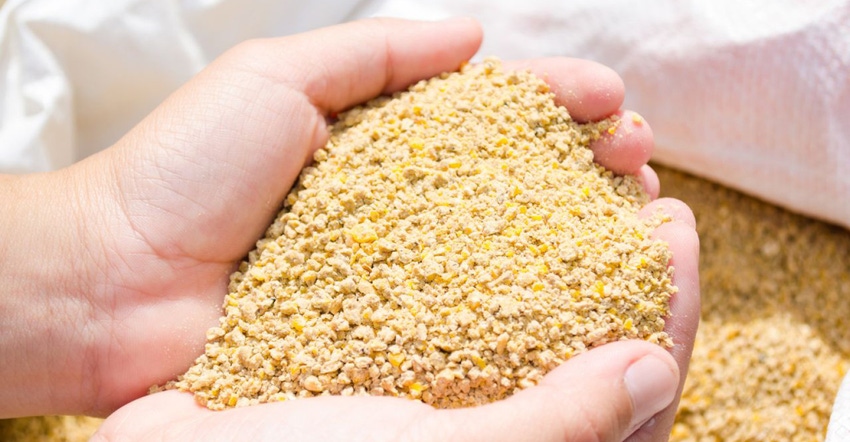U.S. feed industry expresses caution regarding implementation of measures that are neither scientifically proved or approved by federal, state or foreign regulators.

As the U.S. hog industry looks to further refine its biosecurity procedures to keep African swine fever (ASF) and other viruses from entering the country, the U.S. feed industry faces questions related to its supply chain and manufacturing processes and procedures.
In early October, the hog industry issued an informational guidance related to holding times for feedstuffs as a way of potentially reducing the risk associated with ASF and other viruses for U.S. hogs. The guidance was a joint effort of the National Pork Board (NPB), the National Pork Producers Council, the American Association of Swine Veterinarians and the Swine Health Information Center. It urges producers to talk with their feed suppliers to get information in seven key areas:
- A description of the facility’s biosecurity program to minimize the spread of pathogens from people, vehicles and ingredients;
- A description of the facility’s employee training on feed safety;
- A description of the facility’s pet control program;
- A description of the facility’s traceability program;
- A description of the facility’s supplier approval program;
- A determination as to whether the facility is certified by a third-party certification body for food safety, and
- A determination as to whether the facility utilizes ingredients that were manufactured or packaged outside of the U.S.
“Working with your feed supplier to get this type of information is yet another way to help protect your pigs from potential infection from a foreign animal disease,” Dr. Dave Pyburn, NBP senior vice president of science and technology, said. “It’s just one more tool in our arsenal against African swine fever and other diseases that we hope will offer U.S. producer more protection against this growing global threat.”
American Feed Industry Assn. (AFIA) vice president of public policy and education Leah Wilkinson said the feed industry has been working closely with the hog industry to evaluate the potential risk associated with imported feed ingredients. She emphasized, in an interview with Feedstuffs this past week, that it is important to note that the hog industry organizations have issued an educational tool and not a recommended course of action.
The U.S. feed industry has expressed caution regarding the implementation of measures that are neither scientifically proved or approved by federal, state or foreign regulators, but given that the preliminary research has shown that the ASF virus can survive a simulated transboundary shipment in inoculated feed and feed ingredients, the pork industry moved forward with measures that it believes will mitigate the risks of transmission via imported feed ingredients.
"It is important for everyone to be aware that there is data out there that shows that if feed ingredients are inoculated with the viruses -- not just ASF, but other viruses as well -- that the viruses could potentially survive transport," Wilkinson said. "If these ingredients are contaminated with the virus, the potential is there that feed could be a mechanism to transport the virus."
That being so, AFIA stands firm in its opinion that additional research in this area is necessary.
Wilkinson said the feed industry has been actively working to give customers the necessary assurances that the ingredients� the industry offers are not likely contaminated. It also has been helping its member companies better understand how the products they buy are manufactured, what biosecurity practices are in place at the manufacturing level and how best to communicate with customers about those things. The truth is that the likelihood of a virus getting into a vitamin, mineral or amino acid product is very low, she said.
In issuing their educational guidance, the hog industry organizations categorized imported products in two ways: (1) ingredients in sealed or secure containers such as vitamins, minerals and amino acids and (2) bulk ingredients in non-sealed or non-secure containers or totes, such as soybean meal or dried distillers grains. For each category, the organizations gave options based upon whether the products are produced under biosecure conditions or non-biosecure/unknown conditions in the foreign country.
Likewise, Wilkinson said the feed industry has been focused on its own biosecurity practices at the mill level. While changes have resulted from finding porcine epidemic diarrhea virus and avian influenza over the past few years, the feed industry continuously strives to make sure all safeguards possible are in place and that the industry is doing what it can and should be doing, she said, emphasizing that the industry is adamant about having science as the basis for such decisions.
From a logistics standpoint, the feed industry also is evaluating what holding feed ingredients for extended periods of time will entail. Wilkinson said the availability of containers for storage, storage space and what the requirements might be in the winter are all things being reviewed.
While the guidelines apply only to imported products, some in the industry are pondering whether domestic feed ingredients, including corn and soybeans, would need to be stored accordingly prior to feeding to pigs should ASF be found in the U.S. The pork organizations calculated a minimum holding time for holding product from non-biosecure facilities that is bagged or sealed of 78 days after the date of packaging or sealing and 286 days for bulk feed ingredients from non-biosecure facilities.
Wilkinson further cautioned that there are currently no approved mitigants for virus reduction in feed and feed ingredients. The effectiveness of mitigants is still unknown over the suggested duration of use or holding times, as is the impact on product degradation, she said.
About the Author(s)
You May Also Like

.png?width=300&auto=webp&quality=80&disable=upscale)

